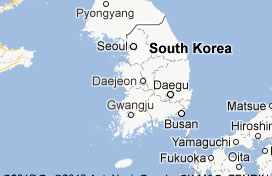Amnesty slams ‘abuse’ of migrant workers in S. Korea
 SEOUL – Migrant farm workers in South Korea have become victims of rampant abuse under a “shameful” work permit system that encourages exploitation, Amnesty International said in a report published Monday.
SEOUL – Migrant farm workers in South Korea have become victims of rampant abuse under a “shameful” work permit system that encourages exploitation, Amnesty International said in a report published Monday.
The report came on the heels of a mission to South Korea by the UN’s special rapporteur on racism, who also cited “serious problems” faced by the growing number of foreign workers hired as low-paid, unskilled manual laborers.
The Amnesty report, titled “Bitter Harvest” and based on interviews with dozens of farm workers around the country, painted a picture of intimidation and violence, coupled with excessive working hours and squalid accommodation.
“The exploitation of migrant farm workers in South Korea is a stain on the country,” said Norma Kang Muico, Asia-Pacific Migrant Rights Researcher at Amnesty.
“The authorities have created a shameful system that allows trafficking for exploitation and forced labor to flourish.
“If South Koreans were trapped in a similar cycle of abuse, there would rightly be outrage,” Muico said.
As of 2013, there were around 250,000 migrant workers in South Korea, 20,000 of them working in the agricultural sector.
They are contracted under the government’s Employment Permit System (EPS) which the Amnesty report criticized for being excessively weighted in favor of employers, leaving workers trapped and vulnerable and without sufficient legal protection.
While employers can fire workers at will, the migrants – mainly from Cambodia, Nepal and Vietnam – can only change jobs if their current employer signs a release form.
Because many rack up large debts at home to get to South Korea, the cost of losing their jobs is enormous, leaving them little leverage when they are exploited.
“The EPS leaves migrant workers at the mercy of unscrupulous employers who take advantage of the system’s severe restrictions on migrants’ ability to change jobs,” Muico said.
“For many migrants saddled with huge debts, staying with an abusive boss appears the only option,” she added.
The report alleged a degree of government complicity, saying exploited workers who sought redress were discouraged by the authorities from taking things forward.
One 25-year-old Cambodian worker told Amnesty he had gone to a government job center with mobile phone footage of his employer beating him.
“The caseworker told me that it was my fault because I had cut the cabbages the wrong way,” he said. “She told me to hurry back and apologize.”
Faced with a rapidly aging population and high urbanization rate among the young, South Korea has turned to migrants to fill labor gaps in the agriculture, fishing and construction sectors.
Amnesty called on the government to ensure the workers basic rights when it came to working hours and rest days, and allow them to change jobs without getting a release form from their employer.
UN Special Rapporteur Mutuma Ruteere had flagged similar concerns with the EPS after his week-long visit to South Korea earlier this month.
As well as often being denied standard remuneration for their labor, Ruteere said non-Korean workers were “often subjected to racist and xenophobic verbal and physical abuse.”














